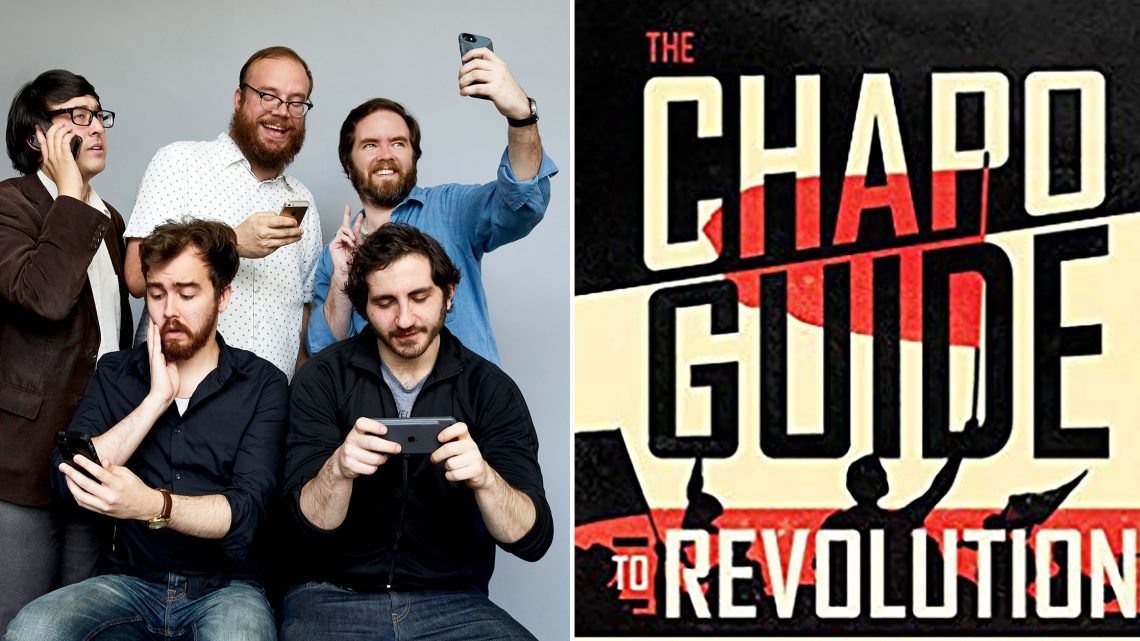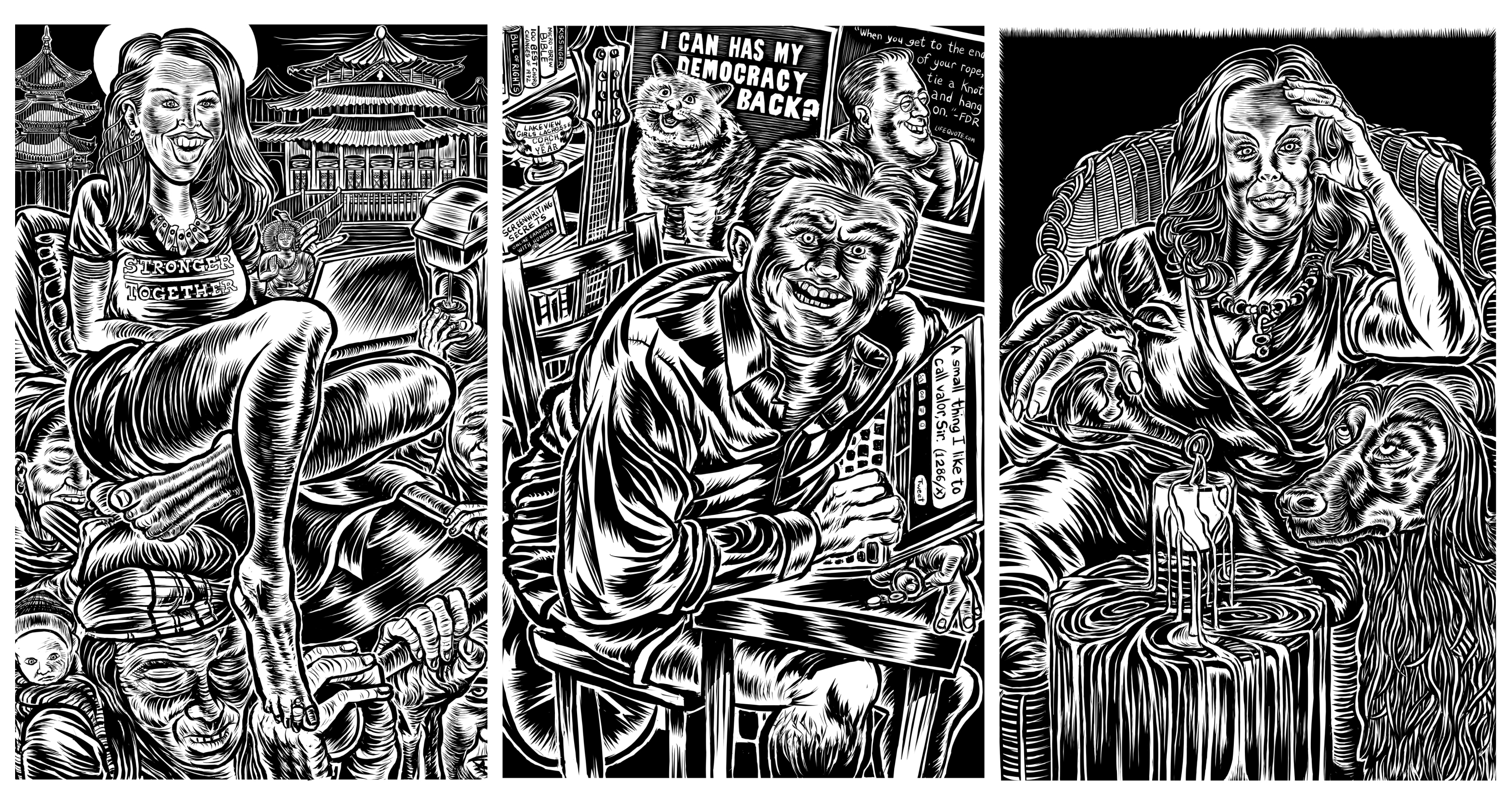
The Chapo Trap House Guys Think the Problem Isn’t Russia, It’s Republicans
August 17, 2018 Off By Justin CaffierA few years ago, no one could have predicted that socialism would seem to many young people like a viable political movement or that the country would be consumed by the question of whether there's a tape of the president saying the N-word. So sure, why can't the Chapo Trap House guys be acutal celebrity pundits with a book and everything? In just two years, New York-based friends Matt Christman, Felix Biederman, Amber A'Lee Frost, Will Menaker, and Virgil Texas (the last of whom has written for VICE) have grown their Simpsons jokes and rant-filled roundtable chats into an enormous platform for lefty conversations. If Pod Save America, the inescapable liberal talk show hosted by former Obama staffers, represents the respectable wing of the Resistance, Chapo represents the angrier, fringier, and more uncompromising part of the left, the part that gets insulted when you call them Democrats.
Having conquered the podcasting world—their 22,000 Patreon subscribers donate more than $100,000 to them per month—the Chapo co-hosts have branched out into books with The Chapo Guide to Revolution: A Manifesto Against Logic, Facts, and Reason, written with help from occasional show producer Brendan James (another former VICE and VICE News contributor). The book, which comes out next week, delves into the ugliness of America's past, present, and future political landscapes, with chapters skewering both parties, the legacy press, and the country's abusive relationship with capitalism. It also contains vicious caricatures of liberal and conservative archetypes, an Aaron Sorkin manga, and a "Chapo KidZone." But amid all the jokes and 'toons, the book does lay out a compelling case for curb-stomping capitalism, which they claim has failed all but the ultra-wealthy.
I recently got on a call with Menaker, Christman, and Texas to talk about the book and what it would take for socialism to take off in the US.
VICE: A common argument in left-wing circles is that we should solve racism or other issues first before tackling economic inequality. How do you respond to that?
Matt Christman: I'd like to hear anyone's actual plan for solving racism. Every person I've ever heard make that argument, literally none of them have an actual answer. None of them have even a close to a suggestion of how to do that other than, I don't know, have people that read the right op-eds or something. Protesting against racism is good, but it should be part of a broader attack against all elements of oppression in this country.
Virgil Texas: Racism in this society is mediated by capitalism to an extent that's it's greater than most other societies, so I would say that redistributive economics would go a long way towards hacking racism at its roots.
Will Menaker: Racism and white supremacy is so embedded into the culture and politics of this country, it's very hard to say. Even though de jure legal racism has been attacked successfully, what is now described as “systemic racism” hasn’t, or it’s metastasized in ways you might expect to replace formal legal forms of racism. All of this is my way of saying I don't know if a nationalized healthcare system or, to quote Hillary Clinton, “breaking up the big banks" that caused the financial crash of 2008 will cure the racism in the hearts of individual people in this country. It probably won't. However, it's still the right thing to do and should be pursued vigorously, regardless.
There’s a through-line in your book and podcast of disgust or disappointment toward the average American voter, whether it’s because they're racist or because they're stupid. So how does one make socialism a big-tent movement? Are there certain voters who are too far gone and not worth fighting for?
Christman: At this point in time, anyone who supports Trump. Anyone who in 2018 says, "Yes, this is our guy, he's good to me." I think that their commitment to just being awful as a political project is far too strong to have any kind of meaningful engagement
Texas: Yes, you've identified yourself as the actual enemy of all good and decent human beings.
Menaker: We say in the book: would a theoretical Trump voter or Republican voter out there vote for something different if there were a political party or a message against the economic domination of everyday American life? Perhaps. The only way we can find out is to make that case and advance that agenda. But this idea that you can have a political ideology or have a politics without enemies I think is foolish. I think these people have to be dealt with—I don't mean like catered to or reached out to. I think they need to be neutralized as much as possible or made as much of a non-factor, politically, because I don't think having a livable or decent future is possible should they get what they want out of politics or government.

Was there anything else planned for the book but cut because it just couldn’t fit in?
Menaker: The one that comes to mind is we had some parodies of newspaper comic strips [in the chapter on media] that didn't make the cut because of legal reasons.
Texas: Dilbert threatened to sue.
Christman: Apparently the estate of Beetle Bailey didn't want to see him shooting kids at Kent State.
Texas: It was just the lawyers that had the problems with them. Cowards. Damn suits.

Speaking of things that have happened since the book’s been printed, you guys frequently dismiss liberals who are obsessed with the notion of Russian interference in the 2016 election. As more news emerges that indicates that that actually happened, are you open to walking back some of that rhetoric?
Texas: I've heard it's said by people that Russians hacked voting machines to make Alexandria Ocasio-Cortez win her primary, and I believe polls done show a majority of Democrats still believe that Hillary had won the election, but Russia actually hacked the voting machines. That's hysteria and that's what we're talking about. Brainless hysteria and scaremongering.
Menaker: Look, I'm all in favor of any investigation into Trump and his criminal malfeasance, of which I'm sure there is ample opportunity for. And if he is prosecuted or impeached because of that, great. However, this doesn't solve our essential political problem. I think these are liberals who do not want to face up to their own failure, both out of the Clinton campaign and the eight years of Obama, and they have decided to play detective. I'm sure there is some truth to [Russian interference]. I just take it at face value that Trump is a deeply corrupt person, who I'm sure is compromised by Russian oligarchs or criminals to some degree.
I don’t think I've seen any systematic or real reporting or evidence that Russia flipped the election one way or the other for Trump any more than, let's say, actual voter repression in this country did. I feel like many people are having this scales-coming-from-their-eyes "how could this happen in America” moment 20 years too late. George W. Bush absolutely stole the 2000 election. There's evidence for that. If the recount were allowed to have continued, Al Gore would have won Florida. We know that. The Supreme Court appointed him president, and then 9/11 happened and the Iraq war.
Texas: The problem isn't some nefarious foreign power. The call is coming from inside the house. The problem is the Republican party. The problem is conservatives. The Republican party and conservatism needs to be destroyed, root and stem.
Menaker: Also, any Democrat who is counter-establishment or even slightly progressive or to the left is now considered “a tool of Putin,” a puppet. They're trying to split the Democratic vote and anything that might be politically useful to the Democrats that might help them change things in this country is being tarred as some intelligence op.
How do you prevent this sentiment from turning into nihilism? How do you still stay engaged and active?
Texas: I think it's the other way around. Watching this stuff and getting obsessed with this stuff is a recipe for total paralysis. You just become totally engrossed in the story and that's all you care about. It’s a daily soap opera.
Menaker: My stories.
Texas: Politics is getting outside of that self-reinforcing spectacle where the norms are brutally enforced and where different concepts are not spoken of. It’s trying to fucking break out of that conversation and talk to other people in your life who are experiencing day-to-day degradation of late capitalism and try to find ways to together fight against them. That's actually engaging in politics. Staring at the TV and waiting for some indictment to come down that will never be there or watching Rachel Maddow put names on a fucking chalkboard, that's not politics.
Menaker: There's nothing politically effective that you do by yourself. Watching TV, listening to a podcast, tweeting, that's all just entertainment. That's all just a game that we all like to play, myself included.
What works is other people, a mass of other people organizing and solidarity. I think that's how you avoid going insane or becoming a nihilist by staying in tune with other people who believe as you do and trying to work together for our betterment as a society.
Texas: No. The way you prevent becoming a nihilist is by buying the book.
This interview has been edited for clarity and length.
Follow Justin Caffier on Twitter.


